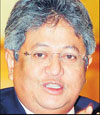
Najib set to be PM like his late father. — Picture by Choo Choy May
Najib, the 55-year-old son of Malaysia's second premier and the nephew of the third, will take the helm in March at a time when this Asian nation of 27 million people grapples with economic problems and rising political and ethnic tensions.
News agency Reuters released a feature today, noting that another rising star of the party that has ruled Malaysia for all 51 years of its existence as a country is Datuk Mukhriz Mahathir, the son of its longest-serving prime minister, Tun Dr Mahathir Mohamad.
On the opposition benches in Parliament sits Nurul Izzah Anwar and her father, veteran politician Datuk Seri Anwar Ibrahim. Anwar is a former deputy premier who once looked set for the top job until he was kicked out of the ruling party and jailed on what he says were false charges.
"There is an Asian belief that political power can be passed on to the next generation through bloodline," said James Chin, political science professor at Monash University in Malaysia.
Critics say the sense that blood entitles a person to exercise power has generated corruption, stymied development and hampered good government.
More often than not, the progeny of political leaders fail to live up to the family name.
"If Malaysians or foreigners expect Najib to be like his father as PM, they will be greatly disappointed," said Abdullah Ahmad, a political author and a former aide to Najib's father.
Najib, who has a bachelor's degree in economics, will take over at a time when a re-energised opposition led by Anwar is seeking to gain power and when economic growth is skidding due to global financial turmoil.
Adding to his troubles, Najib will need to address Malaysia's failure to keep up with more nimble neighbours in the competitiveness and investment stakes.
Growth in Malaysia's export-oriented economy looks set to fall to 3.4 per cent next year, the lowest since 2001. The budget deficit has soared due to spending on fuel subsidies and national infrastructure projects, according to the Malaysian Institute for Economic Research, a leading think-tank.
"I pity Najib. He's taking over from the worst of times and from a man who messed things up," said Abdullah Ahmad, referring to the outgoing premier Datuk Seri Abdullah Ahmad Badawi.
Najib has been in Parliament since the tender age of 22 when he took over the seat of his father, who died in office. He has held posts in the sports, education and defence ministries and now holds the powerful finance portfolio.
His father Tun Abdul Razak Hussein designed Malaysia's race-based system which was supposed to help ethnic Malays climb the economic ladder and compete against the more entrepreneurial ethnic Chinese population. His uncle, Tun Hussein Onn is credited with forging unity among the races during his premiership.
Najib's family links run to the heart of politics and business; his cousin is education minister and his younger brother Nazir runs Malaysia's second-largest bank CIMB.
Najib's recent move on the top job has been marked by continued attacks on his integrity by the opposition and by Internet bloggers obsessed with a lurid murder trial that involved Najib's former aide. The aide was acquitted, but not before Najib had to issue statements denying involvement.
Many political observers believe Najib may simply owe too much to too many people to stake out a separate political identity.
"He (Najib) was coddled and helped all along, first by his uncle Hussein Onn and then by Mahathir, the man who owed a debt of gratitude to his father," said Zainon Ahmad, political editor of the local Sun newspaper.
"Only now I think Najib has to be on his own," he said.
When he took the reins of power in 2003, current prime minister Abdullah looked like a tonic for a country that had grown tired of Dr Mahathir's 22-year rule.
Dr Mahathir dragged Malaysia towards developed nation status, oversaw the building of the iconic Petronas Towers in Kuala Lumpur, and guided the country through the Asian financial crisis of the late 1990s. Yet his long rule was also criticised for the growth of cronyism and its failure to help poor Malays.
Abdullah seemed to have laid the ghost of Dr Mahathir to rest in 2004 when the Barisan Nasional coalition, led by his Umno party, scored its biggest election success on promises to end corruption.
That success turned to dust in elections in March this year when the opposition stunned the government by depriving it of its customary two-thirds majority in Parliament, which means it can no longer automatically change the country's constitution.
Dr Mahathir has since turned on Abdullah, sniping from the sidelines when the premier cancelled some of his massive infrastructure projects. He resigned from Umno, swearing not to return until Abdullah was ousted.
In a further twist to that feud, Mukhriz is battling Abdullah's son-in-law Khairy Jamaluddin for the leadership of Umno's influential youth wing, a staging post to the party presidency and the premiership of the country.
That political battle is a sign that dynasty politics will be around for a long time to come, worrying some Malaysians who feel the country is governed neither by them, nor for them.
"The ones that keep coming back for more are the sons, daughters and grandchildren of yesteryear's leaders," said a comment posted on political blog www.bakrimusa.com.
"It is, to them, their birthright to be accorded such positions as their fathers and forefathers. If you are not born to 'the families', then you must marry into one!"

 •
• 








